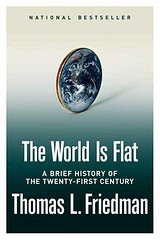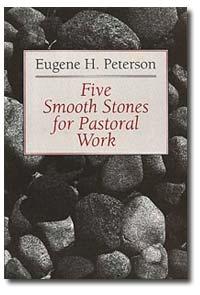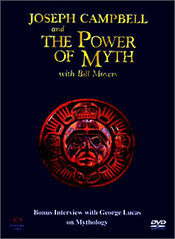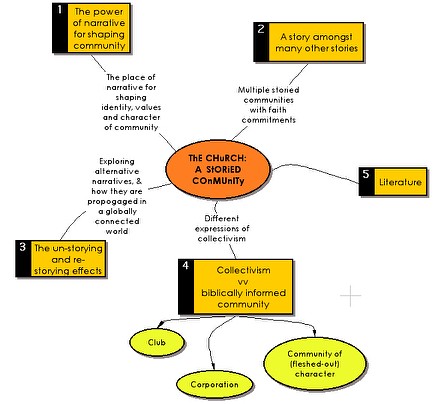The Church as a Storied Community
Sunday, March 19, 2006
Tuesday, July 19, 2005
Friday, July 08, 2005
Wednesday, June 22, 2005
The world is flat
Thomas Friedman's new book The World is Flat is fascinating isn't it? 
It of course restates what Giddens, Castells, himself in Lexus and the Olive Tree, et al have said about globalization, the networked society, and all the implications of globalization on the economy, national and self identity. Doubtless, Friedman has some updated insights.
More interesting to me are the implications of changing conditions in the world for the church, its identity and its mission. In a flatten-ed out world where there are exchanges of old myths and stories and the propogation of new interactively mediated myths (such as narratives found in MMORPGs), can the claims of particularity be upheld in a way which is not arrogant while remaining compelling and persuasive?
Connecting the grand narrative to every day life
Eugene Peterson has a wonderful book entitled Five Smooth Stones for Pastoral Work where he explores the work of pastors in proclaming that Christian metanarrative at the pulpit and then having the challenging task of helping even those who feel excluded from that narrative connect to that larger narrative, which is the history or the story of God's salvation in space and time.
Peterson's book explores how the Megilloth (the five books which form "The Scrolls" in Jewish tradition, the five being Song of Songs, Ruth, Lamentations, Ecclesiastes and Esther) can be fruitfully explored to guide the five critical tasks of pastors: 1)Prayer-directing, 2)story-making, 3)pain sharing, 4)nay-saying and 5) community building.
The announcement in church has usually been clear enough; it is God's will to save every person, to incorporate each created man and woman into the people of God, to graft each private history into the stock of salvation history. But many disqualify themselves, supposing that their individual experience or unique circumstances exempt them from the general truth. Guilt or willfulness or accident makes a loophole, and they assume that what is true for everyone else is not true for them. They are left out. They conclude that they are, somehow, "just not religious" and so unfit to participate in the way of faith. They form negative or neurotic identities, self-understandings unrelated to God's will and love. They feel disorganized; they experience alienation; unable to comprehend their lives as connected narratives that have meaning and make sense. The pastor knows that the story of Gods revelation is a comprehensive narrative that include everyone - how can he provide the insights and incentive to get such persons to understand their own lives as chapters, or at least paragraphs, in the epic narration of God's saving history?
The means by which pastors help the hoi polloi reconnect to the biblical metanarrative would be through the agency of pastoral visitation and pastoral counselling. As would be expected, a very critical skill involved in the art of listening, for it is through listening that people reveal their stories, mundane details and all. The pastoral role is to take the details of articulated stories and try to help members make sense of their stories within the larger framework of God's creation/salvation history.
Peterson's choice of the book of Ruth is no accident too. In that story, Ruth is the outcast outside who eventually finds her place in God's salvation history, and it is through the drama of this particular story that Peterson draw's inspiration for this particular pastoral task.
Actually, this chapter raises an interesting question for me: What is the more effective way of helping people to splice their personal narratives into the larger Christian metanarrative? Through the pastoral work of proclaiming the story at the pulpit, or the pastoral work of listening to other stories and helping them to make sense of their story in the light of biblical salvation history? Which has a deeper, more long lasting and transformational effect? Why? What are implications for the educational ministries for churches?
Tuesday, June 21, 2005
Danger of losing the story?
"In the post-conservative, post-Christian, globally connected, pluralisitc era, local congregatons of story-formed communities face the danger of a diminished realization that they do not possess or embody the story which is supposed to form its identity and the deepest sub-conscious values of its members"
Explore this thesis.
What are the mechanisms and the pull-push factors which might contribute to this condition?
Sunday, June 19, 2005
The Power of Myth (Joseph Campbell)
Bill Moyers' interview with Joseph Campbell is a really powerful book/video which suggests
how myths (used in the technical sense) has power to shape values and group identity.
Greek and Latin and biblica1 literature used be to be part of everyone's education. Now, when these were dropped, a whole tradition of Occidental mythological information was lost. It used to be that these stories were in the minds of people. When the story is in your mind. then you see its relevance to something happening in your own life. It gives you perspective on what’s happening to you. With the loss of that, we've really lost something because we don't have a comparable literature to take its place. These bits of information from ancient times, which have to do with the themes that have supported human life, built civilizations, and informed religions over the millennia, have to do with deep inner problems inner mysteries. inner thresholds of passage, and if you don't know what the guide-signs are along the way, you have to work it out yourself. But once this subject catches you, there is such a feeling, from one or another of these traditions, of information of a deep, rich, life~vivifving sort you don’t want to give it up. Campbell, 2
The Genesis "myth" is included in Campbell's collection of myths highlighted, and if you look at the bottom of the picture, you will see the words "Bonus Interview with George Lucas on Mythology." Yes, Joseph Campbell was very interested in George Lucas's work (and vice versa) because Star Wars represents a modern powerful, almost universal narrative which captures the elements of myth. My sense is that the most pervasive, shared contemporary myths have to be those propagated through the synergistic video-gaming/movie industry -which is why I am mindful of the power of the creative, knowledge class!!!
In a postmodern society, there is a sense that all stories matter and have the same function. Grenz writes:
In a pluralistic age, belief is "in." This is a good thing. Indeed, an important contribution of our pluralistic context has been its reaffirmation of the importance of believing. Yet, many voices assert that it really doesn't make any differece what you believe so long as you believe something–anything. Therefore, we ask, "Do beliefs matter at all? Is what you believe important?"
Christian apologists argue that there must be reason to trust the story you commit yourself to. So the big question is, if the Christian myth (used in a technical sense again) makes claims to be trustworthy, what in the story is so compelling and powerful?
Friday, June 10, 2005
Lecture notes by Dr. Thomas B, Leininger
Lecture notes on how stories shape morality
Draws from Hauerwas's A Story Formed Community
A multimedia essay on electronic visual narratives
A multimedia essay on electronic visual narratives
Here's a paragraph from this really fascinating essay:
The media and forms of communication facilitated by computers are opening us further to persuasion by virtual experience. They change the scale and structure of our experiences. The World Wide Web goes on and on, chaotically, with virtual lives available in innumerable linked but different dimensions. Multiplicitous in its times and multimediated in its experiences, the allure of its learning far exceeds the labyrinthine library that Umberto Eco used The Name of the Rose to evoke the amazing resources of Western civilization.[29] Yet the Escher architecture of the medieval library tower surely stands also as a postmodern emblem of the coming Net(work). Internet time can be a web crawler's or spinner's, with advertisers already are scrambling to exploit its capacities for persuasion. Computer time is active and playful. Virtual gambling has some advantages over visiting the neighborhood casino. Unhappy about that? Then engage some of the Web sites with activities to alter your moods. Doing persuades, and electronic activities do more than stories.




